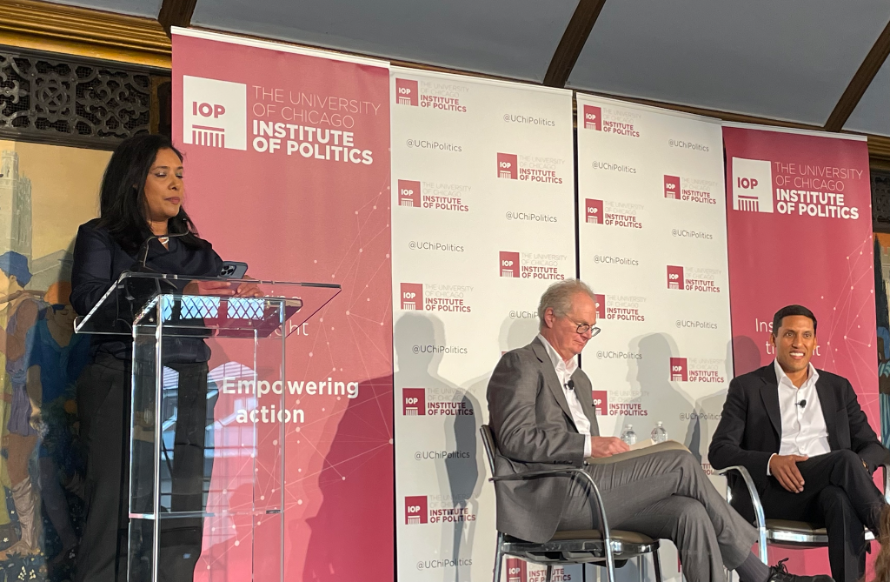
Eric Parrilla
Alivisatos and Shah at the IOP talk.
University of Chicago President Paul Alivisatos and Rajiv Shah, the president of the Rockefeller Foundation and former administrator of the U.S. Agency for International Development, held a discussion about Shah’s new book: Big Bets: How Large-Change Really Happens on October 20.
The book calls for a “big-bets philosophy” to confront large-scale problems besetting the world. Rather than pursuing incremental change, Shah argues that “big bets” can attract the support and collaboration needed to produce effective solutions to big problems such as world hunger or climate change.
Like the University of Chicago, the Rockefeller Foundation was founded by the “big bets” of John D. Rockefeller. For more than a century, the foundation has had a stated aim of advancing the well-being of humanity around the world. By investing in infrastructure projects such as solar panels and supporting local innovators, the foundation helps to confront global problems such as food insecurity, poor health access, and climate change.
As the foundation’s 13th president, Shah is both the first Indian American and the youngest to hold the position since its founding. As the USAID administrator, Shah was at the forefront of the U.S. humanitarian response to both the devastating earthquake in Haiti in 2010 and the Ebola epidemic in West Africa.
During the talk, which was hosted by the Institute of Politics (IOP), Shah discussed his years at the University of Pennsylvania, telling the audience that he was split between wanting to pursue a career in medicine and getting more involved in politics. At the time, he said, “there wasn’t much courage, there was confusion.”
While Shah was volunteering for then-Vice President Al Gore’s 2000 presidential campaign, he was introduced to the Bill and Melinda Gates Foundation, where he would begin his career in humanitarian efforts. It was his work with the foundation and its effort to vaccinate millions of impoverished children around the world that allowed him to learn about what he calls the “big bets” mindset.
The “big bets” mindset, according to Shah, starts with dreaming big and confronting huge problems regardless of how difficult they may seem. Another vital step is seeking partnerships with unlikely collaborators to bring about the best solutions possible.
Shah offered an example of the Rockefeller Foundation partnering with private companies to bring cheap, renewable energy to villages in India and Sub-Saharan Africa. In doing so, the foundation is acting on its “big bet” of bringing electricity to a billion people.
Yet Shah warns of the potential for an individual or an organization to get caught up in the “minutiae of the bet rather than going back to the big vision.” In order to prevent a “big bet” from losing momentum and failing to produce results, Shah notes, a person and organization should always remain cognizant of their larger vision.
Describing his tenure as USAID administrator, Shah remembered feeling constantly scrutinized by politicians and the media, leaving him little room to self-inquire and maintain open dialogue with experts and colleagues about potential solutions.
“When you’re in politics and there’s a lot of scrutiny on you, you don’t have the safe space to self-inquire. There’s a lot more heat in figuring out those public problems,” he said.
Shah encourages students to keep their “inquiry spirit” with them in their careers so that they choose to conduct dialogue in the face of complex challenges. “Try to avoid being overwhelmed from what’s in the news. That can prevent you from making big bets,” he said.